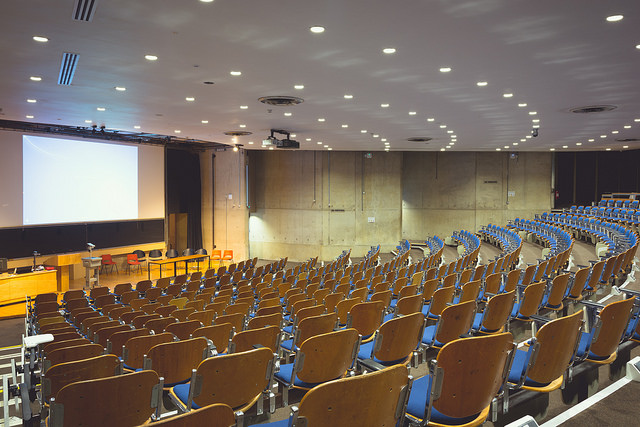At its most basic level, university is a place of learning. Based on my experience of Trinity so far, university is also intended as a space for open discussion. Here, students are encouraged to swap ideas and share knowledge so that in the process, they can learn from not only their professors, but also their peers.
Sometimes, however, I wonder about how open this discussion really is. With our learning comes certain self-assuredness. The self-assured student is opinionated and informed. The self-assured student has a firm grasp on what’s right and wrong and is well versed in open discussion. Every once in awhile, though, I become a bit jaded with the self-assured student.
For example, in my first week of tutorials in the English department, I was struck by the confidence that some of my peers possessed. How can they speak so comfortably? How can they be so sure that they’re so right? It’s this kind of confidence that I so admire, but that I’m also extremely weary of. While there is nothing worse than a silent tutorial or seminar, in many ways people using class as a space to broadcast divisive opinions can be worse because it doesn’t always invite discussion.
While there is nothing worse than a silent tutorial or seminar, in many ways people using class as a space to broadcast divisive opinions can be worse because it doesn’t always invite discussion
In her article “Fences: The Brexit Diary”, Zadie Smith discusses the tendency of young people to need to “seem to be right”, “to be on the right side of an issue”. She continues to discuss the “strange tendency of the younger lefty generation to censor or silence speech or opinions they consider in some way wrong”. This reminded me of countless tutorials spent trying to grapple with how someone could be so confident that they were right. And how sometimes, this confidence can actually shut down discussion, instead of facilitating it. Or rather, promote a sort of one-track discussion.
The rejection of open discussion in universities is an issue that has gained a lot of publicity in recent years. In August, Dean of Students at The University of Chicago wrote to incoming freshman students outlining that the university did not support so-called “safe spaces” or trigger warnings as it impeded the university’s “commitment to academic freedom”. While it may be a microcosm of what is a much larger, global issue, by closing down, or rather failing to allow open discussion, the self-assured student can be seen as contributing to this problem by not allowing a diverse range of opinions being vocalised on campuses.
The dangers of falling into a one-track discussion seem relevant in light of the ongoing abortion debate in Ireland. Coming from outside of Ireland, my natural response to the fact that abortion is illegal in Ireland is incomprehension. But rather than staying blindly on one side of the issue, I want to try and understand why this is the case. To shut down discussion on the other side entirely is to unjustly silence, and far from promoting what many would consider liberal, pro-choice ideals. It is close-minded, and prevents anyone from questioning their own position.
To shut down discussion on the other side entirely is to unjustly silence, and far from promoting what many would consider liberal, pro-choice ideals
Walking home from the march to repeal the eighth amendment on Saturday, a car drove by donned with a big advertisement plastered to it reading “Abortion Harms Mothers and Babies”, blaring music with pro-life lyrics. I was surrounded by people emerging from the incredible atmosphere of the March: many clad in “REPEAL” jumpers from the Repeal Project, a few holding signs and a couple still muttering remnants of the chants. Everyone stopped to look at the passing car, acknowledging its difference in the scene. However, nobody yelled abuse after it, or tried to disrupt its course. I think that’s remarkable.
Harnessing completely open discussion is unusual, even in an inclusive college setting. Being able to think critically and develop your own opinions is a crucial part of university learning, but still being able to acknowledge the opposite side is important. While my opinions adapt during my college years, I aim to go forward with equal measures of confidence and caution, particularly because the opinions of a self-assured student are often changing.







